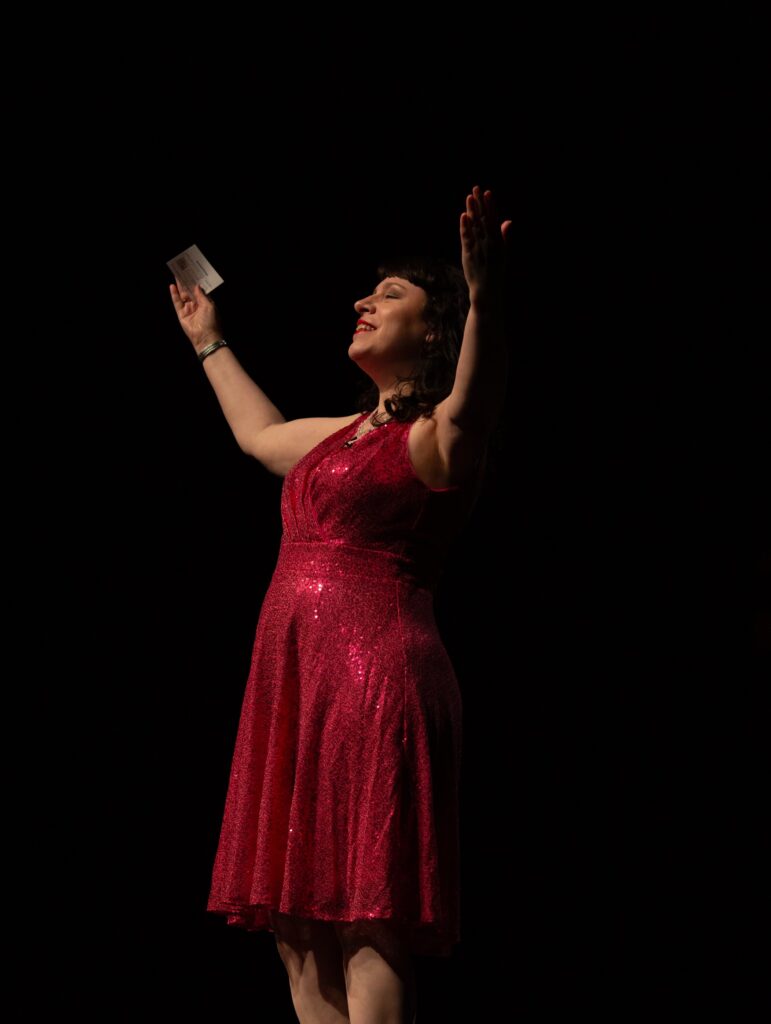The New York City-based musical improv troupe performed at WMPAC as part of its national tour
Avi Lapchick EBS CONTRIBUTOR
For most live performances, all that is asked of audience members is their full attention and their silent respect. Shouting out of turn? Don’t even dare.
However, in the case of “Broadway’s Next Hit Musical,” the cast relies entirely on its audience’s blunt—at some points animalistic—participation. At “the Phony Awards,” anything goes.
The six-piece improv group calls home New York City’s Tony Award-winning club, 54 Below.
Much like the annual Tony Awards for which it is named, the show is set up like an award show featuring once-in-a-generation musical and acting talent, and a winning performance voted by the audience. And from there, it deviates.
Before the cast took the stage at Warren Miller Performing Arts Center on Friday evening, audience members were prompted to submit notecards containing made-up song titles. Submissions ranged from “I Love Me a Rootbeer Float” to “Magic Mushrooms With Grandma.”


After a hilariously topical standup act from emcee Greg Triggs that poked at Big Sky’s imported fresh produce (or lack thereof), the Wilson Hotel’s kitschy lobby art and the locals’ obsession with snowfall, Triggs beckoned the rest of the cast centerstage to read from the fishbowl of bizarre song titles.
Cast members Pat Swearingen, Heidi Gleichauf, Deborah Rabbai and Rob Schiffmann took the stage in order of appearance, each delivering completely unrehearsed solo performances set to the tune of pianist George Luton’s extraterrestrial musical ability.
Swearingen, arguably the fan-favorite of Friday night’s troupe for his belly laugh-inducing delivery and quirky body language, kicked off the first act with his interpretation of the song “First Kiss Blues,” which he quickly wove into a gripping yet perfectly stupid story about a prairie love affair in the 1800s.
Gleichauf followed with her rendition of “My Sister Named Jan,” a track in her aptly-named musical “Jam” about twin sister heirs to the biggest jam factory in town. With comedic timing so perfectly placed it felt rehearsed, even when a song lulled and left the audience wondering how it would all tie in, Gleichauf never failed to deliver the punch.
Rabbai—always sharp, never awkward—performed “My Ex Cleopatra,” a song about the love triangle between Cleopatra, Mark Antony and her cat. It was clear Rabbai has honed to perfection the art of improv that doesn’t feel like improv.
Finally, Schiffmann’s take on “Winter Breezes,” following a couple near-divorce on vacation in Big Sky, won the audience’s vote as the sketch that would occupy the entire latter half of the show.
Submitted by audience member Scott Camerlo, the title “Winter Breezes” came to him innocently—it fittingly opposed the famous Seals & Crofts song, “Summer Breeze.” However, Camerlo did not expect his song to be the winning number, let alone chosen.

“You look at all those pieces of paper in the bowl and they happen to choose mine—I thought that was pretty cool,” Camerlo shared after the show. “[The cast] did it justice.”
The final act featured a 45-minute-long version of “Winter Breezes” and brought all four main cast members onto stage. This was the most involved moment for the audience who were collectively cast as crows and made to squawk whenever Schiffmann panned to the fourth wall.
Additionally, Schiffmann drew another card as the must-contain lyrics: “A hunk with the junk.”
For the most part, the cast delivered adult humor expertly wrapped in kid-friendly language and actions—except perhaps for Swearingen’s prosthetic bulge in Act 5, which maintained uproarious laughter throughout the second half’s duration and contributed to a standing ovation at curtain call.
The chemistry between not only the cast members, but also Luton’s playing was so harmonious it could only be explained by magic. Or, as Triggs called it, intentional preparation.
To tailor a show to its designated audience, Triggs said the cast dedicates time to researching each tour destination by exploring the area and speaking to locals ahead of the live performance.
“I think each community has a way of telling you what its priorities are, and the ideas we get from the audience certainly help. ‘Winter Breezes,’ for example,” Triggs said.
Luton shared a similar sentiment on perfecting the live shows. To him, the key to matching the pace of his castmates is a good ear.
“Oftentimes [my castmates] are trying to get to this lyric that is supposed to be very central. When I’m pacing it, I feel like they’re working their way lyrically towards where they need to be so it’s easy to be on the same page because, musically and lyrically, they’re doing what they have to do—it’s very communicative,” Luton said. “We’re all saying ‘Yes, and’ in some way.”
Likewise, Schiffmann added the preparation that goes into their shows is a lot like an athlete preparing for a big game or event.
“When you’re playing a sport, you don’t practice the specific game; you practice the skills that prepare you for whatever the game ends up being,” he said. “It’s the same thing in improvisation: you’re practicing the skill of listening, accepting ideas and building upon them, and understanding melody and story so that in any given situation you’re able to pull out those skills.”













